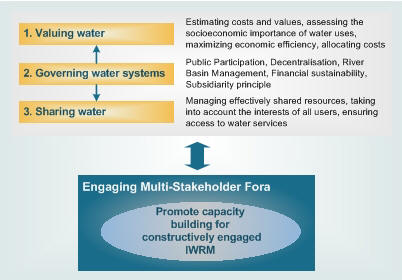In this issue:
The INECO
Approach in IWRM
Project
Activities
A participatory approach
Overview of the INECO Case Studies
Problem Analysis in the Damour River Basin, Lebanon
Major INECO events during the first year of the project
INECO Stakeholder workshop in Tunisia
Stakeholder consultation in Lebanon
The Egypt Women Awareness Symposium
The 1st semester Deliverables of INECO
Future
project events
The INECO Consortium |
The INECO Project Framework
|
|
INECO's main strategic goal is capacity
building and the constructive engagement
of Stakeholders in Integrated Water
Resources Management planning.
Together with the establishment and
strengthening of a network of research
institutes, public authorities and
stakeholders, the project will focus
on institutional and economic
instruments and will address issues (or
focal water management problems) which
are related (directly or
indirectly) to three water management
challenges (see Fig.
below):
-
Sharing water,
referring to the mechanisms
(institutional, regulatory,
legislative, economic) in place for
water allocation at the river basin
level, at the service provision
level (between users) and at the
transnational level.
|
-
Valuing water,
referring to the assessment of costs
and values in water use, the maximisation of economic efficiency,
the implementation of the
cost-recovery principle for
supporting sustainable water service
delivery, and the implementation of
the user-pays and beneficiary-pays
principles.
-
Governing water wisely,
referring to the institutional
environment that enables IWRM
implementation.
Each challenge suggests different
issues that should be addressed
within a water management system,
and will have diverse impacts at different
levels of the local societies.
|
|

The framework for the implementation of INECO
|
|
In this
perspective, the project analyses
instruments according to the
deficiencies they would address in
each functional level of water
systems' management, i.e.:
-
The
constitutional or water
policy and law functional level,
which provides the enabling
environment for the successful
functioning of the system, and
includes the development of water
policies, institutional policies,
including human resources
development, normative and
executive legislation.
-
The
organizational or water resource
management functional level,
which involves the coordination,
planning, decision making and
policing of water use and users
in water systems (river basins
and aquifers).
|
-
The
operational or water use
functional level, which focuses
at the use or control of water
for specific purposes (e.g. water supply and
sanitation, irrigation and
drainage, flood protection, hydropower, industrial
supplies, water for tourism and the preservation
or rehabilitation of ecosystems).
The final output
of INECO should be viewed as
a "social experiment" in capacity
building and policy framing; rather than
hoping to introduce "solutions" to the
water management issues, INECO aims at
providing experience and support to
local societies towards a shift in their
perceptions and subsequently in their
water management practices, and at the
development a comprehensive, adaptable
guideline framework to assist in the
process.
|
|

|
|


